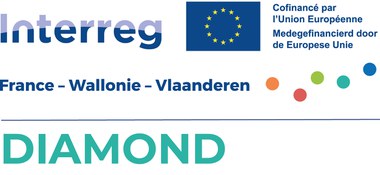DIAMOND: The smart bandage for diabetic wounds
The aim of the DIAMOND project is to develop a connected dressing for the wounds of diabetic patients, especially on their feet, which are prone to ulcers. The dressings will contain sensors for real-time monitoring of biological parameters that indicate infection or poor wound healing, and a stimuli-responsive hydrogel loaded with drugs that can be released on demand.
There are currently two different treatments for diabetic foot ulcers. The first consists of physically eliminating the bacterial biofilm by frequent debridement of the foot, which removes the necrotic tissue around and in the wound. This invasive procedure prolongs the healing period. The second treatment consists of antibiotics, which are increasingly less effective. Unfortunately, in the most severe cases, amputation remains the only alternative to control the infection (8,400 amputations in France in 2016). It has therefore become necessary to find new, more effective treatments to limit these disabling complications.
By developing our connected dressing, we can deliver medicine directly to the wound at the most appropriate time. The patient receives exactly the right amount of medication thanks to sensors in the dressing, which detect the needs of the healing tissue and activate the release of the active ingredients in the dressing's hydrogel into the wound. This treatment is more effective and has no toxic effect on the body. At the end of the project, the developed solution can be transferred to dressing manufacturers for large-scale application for the treatment of all types of wounds.
UGent CTSE is contributing its expertise in electrospinning nanofibre membranes to the development of the DIAMOND intelligent wound dressing. Different hybrid structures based on nanofibre membranes and hydrogels will be developed for the dressing. In addition, nanofibre membranes with a specific structure for the storage and release of drugs or active ingredients will be spun.
CTSE is also involved in the horizontal activities of the project: communication, dissemination and exploitation of project results. CTSE will therefore also participate in workshops/contact days/conferences and the like to make the project more widely known to the general public and the industry.
Further information
Acknowledgments
This project runs from 1 July 2024 to 30 June 2028 and is financed by the Interreg France Wallonia Flanders program for a total budget of 3.2 million euros.
Partnership:
The Diabetes Liga and the HELORA University Hospital are associated partners.
Contact
Prof. dr. ir. Karen De Clerck (Karen.DeClerck@UGent.be)



